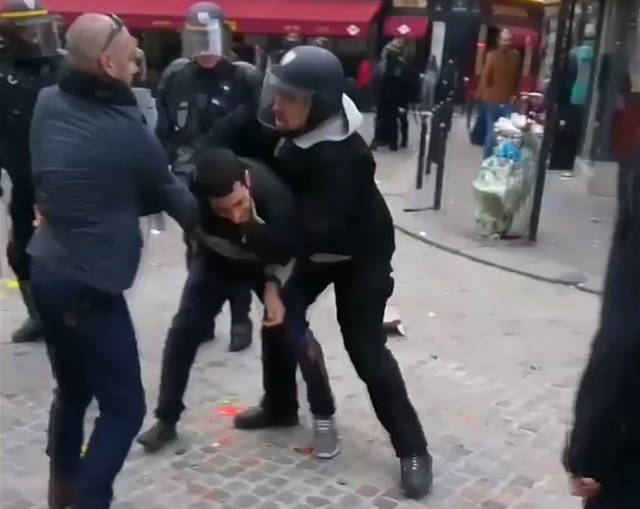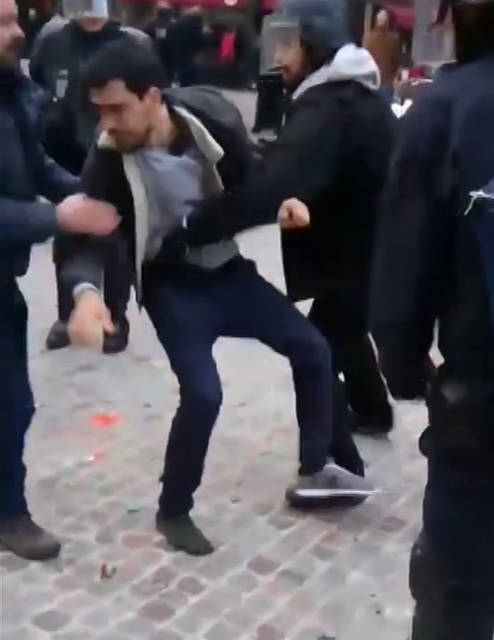PARIS — A video showing one of French President Emmanuel Macron’s security chiefs beating a student demonstrator, until now cloaked in secrecy, is drawing a fierce public backlash over what is seen as mild punishment and a possible cover-up.
The video of the May 1 event in Paris, revealed by Le Monde on Wednesday evening, shows Alexandre Benalla in a helmet with police markings, and surrounded by riot police, brutally dragging off a woman from a demonstration and then repeatedly beating a young man on the ground. The man is heard begging him to stop. Another man in civilian clothing pulled the young man to the ground.
Police, who had hauled the man from the crowd before Benalla took over, didn’t intervene. Benalla then left the scene. The second man was apparently a gendarme who Le Monde said had worked with Benalla in the past.
The uproar over Benalla’s punishment — a two-week suspension and a change in responsibilities — forced top French officials to address the issue Thursday. But Macron has remained silent. Benalla, who hasn’t commented on the matter, handled Macron’s security during the presidential campaign.
Prime Minister Edouard Philippe, responding to questions in the Senate, called the event “shocking,” but stumbled to respond to questions, notably whether all French are equal before the law.
Interior Minister Gerard Collomb said that the two men “obviously had no legitimate (reason) to intervene.” He said he has demanded that a police unit which investigates suspected criminal behavior by officers explain the rules for observers and verify whether they were respected.
Condemning the “unacceptable behavior,” Macron spokesman Bruno Roger-Petit said that Benalla was also removed from his responsibilities of organizing security for presidential trips — though he maintains his office at the Elysee Palace.
In addition, authorities launched a preliminary investigation that could lead to charges against Benalla, a judicial official said on condition of anonymity because he wasn’t authorized to discuss an ongoing case.
Despite this, Benalla has been seen this month on the ground with police at several high-profile events, including the return home Monday of France’s champion World Cup team, an event attended by hundreds of thousands.
Macron, in the Dordogne region to officially launch a new postage stamp, didn’t respond to questions about the scandal. The upstart centrist elected last year had promised an exemplary presidency during his term to break with unending cases of corruption in French politics.
Roger-Petit said the punishment dealt out to Benalla was the “most serious” ever given to a top aide at the presidential Elysee Palace and served as a “last warning before dismissal.”
Opposition politicians expressed shock, with some denouncing a climate of impunity at the top of the French political hierarchy and asking Macron to personally address the issue.
The head of France’s main conservative party The Republicans, Laurent Wauquiez, asked on Europe 1 radio if the government was trying to “hush the affair.”
Roger-Petit stressed that Benalla had requested authorization to use his day off “to observe” security forces’ operations on May Day when marches are traditionally held. It was granted.
It was unclear why the young man under attack, who wasn’t detained, was singled out by police before Benalla intervened.
“An observer doesn’t act like that,” said the spokesman for the UNSA-Police union. They are typically equipped and briefed in advance, and the framework is “completely clear,” Philippe Capon told BFM-TV.
He couldn’t say why police didn’t stop Benalla.
The context was “special,” he said. “He was an observer from the Elysee. When police officials hear the word ‘Elysee’ there is a particular apprehension.”






